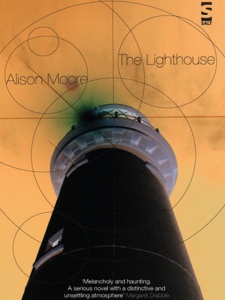 Rating: 3.5
Rating: 3.5
The Lighthouse
A Novel by Alison Moore
2012 / 192 Pages
The Setup: The Lighthouse begins on a North Sea ferry, on whose blustery outer deck stands Futh, a middle-aged, recently separated man heading to Germany for a restorative walking holiday.
Spending his first night in Hellhaus at a small, family-run hotel, he finds the landlady hospitable but is troubled by an encounter with an inexplicably hostile barman.
In the morning, Futh puts the episode behind him and sets out on his week-long circular walk along the Rhine. As he travels, he contemplates his childhood; a complicated friendship with the son of a lonely neighbour; his parents’ broken marriage and his own. But the story he keeps coming back to, the person and the event affecting all others, is his mother and her abandonment of him as a boy, which left him with a void to fill, a substitute to find.
He recalls his first trip to Germany with his newly single father. He is mindful of something he neglected to do there, an omission which threatens to have devastating repercussions for him this time around.
At the end of the week, Futh, sunburnt and blistered, comes to the end of his circular walk, returning to what he sees as the sanctuary of the Hellhaus hotel, unaware of the events which have been unfolding there in his absence. (From the hardcover edition)
This review was simultaneously published on Opinionless on 08/28/2012
I’m guessing that I’m not the first person, nor will I be the last, to point out that at first glance of the descriptions of the twelve long listed titles for this year’s Man Booker Prize, Alison Moore’s The Lighthouse and Rachel Joyce’s The Unlikely Pilgrimage of Harold Fry probably share the most in common with one another, being that they both revolve around men who are intent on travelling by foot while they reminisce about key events from their past. However I’m happy to report that the similarities end there.
The novel’s protagonist Futh is a somewhat social awkward gentleman who’s a little slow on the uptake when it comes to common sense. Recently separated from his wife, he’s decided to book a weeklong vacation-type walking trip alongside Germany’s longest river, the Rhine. The details of this holiday jaunt are fairly straightforward. Every day he’ll walk a certain distance and each evening he’ll retire to a different hotel where his lone suitcase full of clothing and toiletries, couriered separately between locations, will be waiting for him. Eventually he plans to end the journey back where he began, in a small husband and wife operated establishment known as Hellhaus.
Almost immediately though things get off to a bad start for Futh and just as quickly, by way of her amazingly descriptive, incredibly warm and inviting writing style, author Alison Moore sets the stage for a truly unique literary adventure, one in which the past and present collide in unexpected and unpredictable ways which serve to highlight the truly random nature of life.
After surviving a rather strange detour involving a man met on the ferry and his overbearing mother, and much to the chagrin of Ester, the housekeeper at Hellhaus, Futh arrives late for his check-in. In the grand scheme of things this minor annoyance shouldn’t be all that big of a deal really, but instead, unbeknownst to Futh, it sets the stage for interesting series of events to occur. And so the next morning he begins walking. And he begins remembering. And as the flood of memories wash over him the reader is transported back to an earlier, but no less complicated part of Futh’s life. While these random fragments of memories span from childhood all the way through marriage, one in particular burns the brightest. The final moments before his mother abandoned him.
Just as the reader begins to puzzle over what could possibly compel a mother to leave her child and how all of Futh’s memories fit together to tell a larger, more complex story, Moore turns things sideways, introducing alternating chapters that are dedicated to exploring memories from Ester’s past. How do these two characters, who prior to their brief encounter at Hellhaus, fit together? What is the common thread that unites them? It’s the lighthouse of course, but for completely different reasons.
Powered by pitch perfect foreshadowing and brilliantly sprinkled with amazing symbolism, The Lighthouse is a short powerhouse of a novel, but ultimately it falls just inches shy of its aspiration to be something truly special because of a rather jarring ending which sadly feels a bit rushed, if not plain underdeveloped. It’s not so much what occurs that is questionable in nature, but rather the way in which it comes about. Still, the journey offered here is an important one to undertake and the questions raised by the novel’s final moments are difficult to shake.
If you can only read one novel about a man traveling by foot this year, this is the one to pick.
NICE review Aaron!!